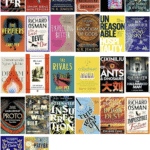I’ve been thinking about dreams in fiction. And, more specifically, why we accept them without puzzlement. After all, it should be obvious that fictional dreams tend to bear absolutely no resemblance to real dreams. Real dreams are not just surreal but incoherent – it’s not that your living room suddenly morphed into a spaceship, it’s that your living room inexplicably was a spaceship, at the same time, because it was your birthday. They are filled not with the profound but with the ‘whatever’s crossed your mind over the past few days’. And real dreams also tend to make terrible narratives: and then X happened, and then Y happened – no wait, maybe it didn’t, because the spaceship had exploded by then? – but then Z definitely happened, and then I woke up.
So it’s no surprise that writers don’t go down the tedious route of describing ‘realistic’ dreams for their characters any more than they would devote a chapter between ‘boy meets girl’ and ‘boy turns out to be vampire’ to the unremarkable weather which didn’t signify anything about their relationship because, y’know, it was just so unremarkable. Nor is it surprising that dreams provide a tempting convention through which to explore hidden desires, hint at broader themes or just blatantly overuse metaphors and ellipses. A little bit of consequence-free magic to further the plot. (In cinema, it’s also an excuse for cool visuals.)
No, my question is why we don’t find it jarring to substitute ‘reflective surreal interlude’ for ‘incoherent jumble’. Is this just a convention which endures through its continued use in fiction? Is it a legacy of Freud? Does it just reflect the fact that most things in fiction contribute to a message of some sort – unlike real life – and dreams shouldn’t be any different? The more you think about it, the weirder all of fiction becomes: we become so trained to explain in GCSE exams that the stormy weather mirrored the stormy relationship (and et al.) that we never wonder why on earth it should. Why is it satisfying? Is it the same runaway obsession with ‘purpose’ and ‘meaning’ which results in the mental train wrecks of final causes and Alpha courses?
(But this isn’t a complaint against fiction. Indeed, one of the beauties of fiction is that it can be demonstrably and wholeheartedly enjoyed without permanently overturning what we know to be true. If human beings sat stony-faced in cinemas, thinking about the mechanics of projection, that would be a shame. They don’t.)
In real life: Sophie, waffles; Irfan, man of letters; Owen, Space Munity!; Oliver, “Mr. Jones and Mr. Smith”. There you go – it’s blogging with all the speed and clarity of the shipping forecast ![]()







No, Dominic, no!!! You can’t add another thing for me to puzzle and be cynical about… now I’m not only going to over-analyse everything I read, I am also going to over-analyse everything I write! Bah! Bah, I say!